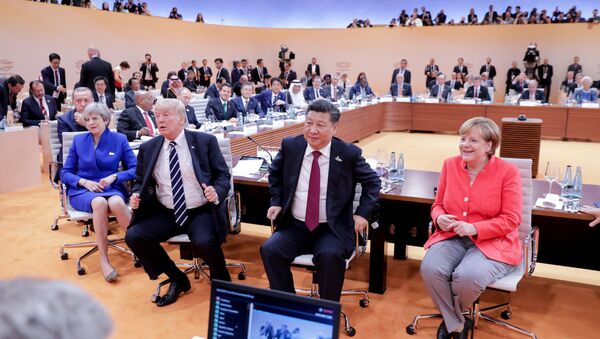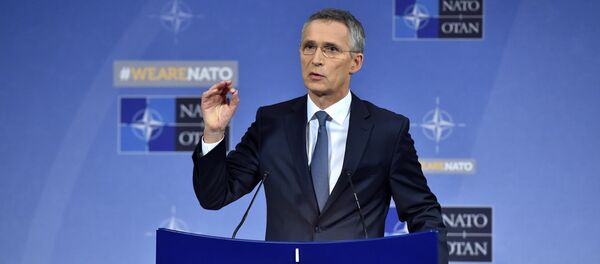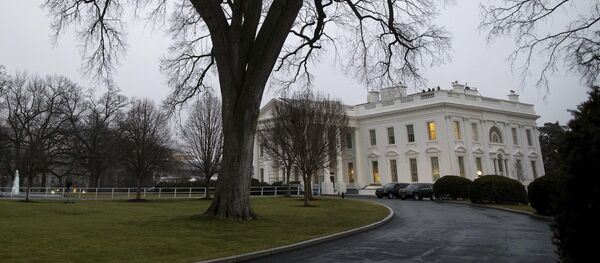After slapping 25 percent tariffs on Chinese products valued at $50 billion last week, US President Donald Trump said he has instructed the United States Trade Representative to identify $200 billion worth of Chinese goods for additional tariffs at a rate of 10 percent, according to a statement released by the White House on Monday.
Save 'World's Factory'
The latest escalation in trade tensions came after an agreement between the two nations, reached during a Chinese delegation’s visit to Washington last month, failed to satisfy Trump’s demand to cut massive US trade deficit against China, which reached a record high of $375.6 billion in 2017.
As harsh tariffs on Chinese products are unlikely to reduce China’s exports to the United States significantly and help improve US trade deficit, the Trump administration could be going after foreign enterprises outsourcing their production to China and trying to force them to move the jobs away, economists suggested.
"One of the goals of the US policy to introduce tough tariffs [on Chinese products] is to force the foreign enterprises investing in China move away, back to the United States or to somewhere else. It’s possible that some companies could decide to move their production from China to Vietnam. This kind of diversion is inevitable. Some Chinese Original Equipment Manufacturers (OEMs) could choose not to export to the United States anymore, while other foreign investors could decide to move away," Tu Xinquan, the dean of China Institute for WTO Studies, the University of International Business and Economics in Beijing, told Sputnik.
READ MORE: Scholars: Trade War Could Provoke Recession in the US in 2019
During his presidential election campaign, Trump repeatedly vowed to bring manufacturing jobs back to the United States. But Tu pointed out that China’s strength in manufacturing certain high-tech products such as smartphones could help the nation save the jobs in those sectors.
"For Chinese OEMs like Foxconn, it is unlikely for Apple to find a second company that can replace it. For Foxconn, it is also not so easy for it to find another country that can take over the manufacturing of Apple products. It will be difficult for Foxconn to find enough skilled workers in Vietnam or Brazil. Companies like Foxconn just have to try to deal with the additional cost, because of higher tariffs. The proposed tariffs rate of 25 percent is not fatal and could be absorbed," he said.
"This is also probably why Chinese government introduced a series of new policies on foreign investments, as part of an effort to convince them to stay. It’s possible for them to offset the additional cost from higher tariffs with discounts from new preferential policies from China. It’s all about numbers in the end. It’s important for the Chinese government to help those companies lower their operational cost in China, through lower taxation, improved business environment and reduced transportation cost," he said.
Not Dependent on US Market
The result of a trade war is usually decided by the level of endurance of a country and whether it could handle the pain inflicted by the other side’s trade policies. Some analysts argued that China’s weakness in a trade war against the United States lies in export-oriented Chinese companies’ dependence on the US market.
However, Tu argued that Chinese companies’ reliance on US market is often overstated.
"I don't agree with the argument that Chinese exports would be doomed without the US market. It’s very similar to some major US companies like Amazon, Facebook and Google continued to flourish without a foothold in the Chinese market, which is often touted as too big of a market to give up on. Those US companies have no problem at all without the Chinese market. I think the same can be said about the importance of the US market. From a market point of view, the US market is replaceable," he said.
At the same time, the expert stressed that the strength of the United States in high-tech industries, especially computer chips, should not be overlooked, as Chinese telecom giant ZTE face questions of survival after being denied access to US chips.
"On the contrary, supplies from the United States are much more difficult for us to find a replacement in the near future, just like what happened to ZTE. It’s simply impossible for us to find another place that can offer the same chips. I always believed that cutting off supplies to US high-tech products would be the killer option for the United States," he said.
READ MORE: Fmr White House Adviser Outlines 2 Ways Trump Trade Tiffs May Impact Oil Prices
Tu does not expect the Trump administration to go for the "killer option" of introducing a similar sales ban against other Chinese companies such as Huawei or Lenovo over national security concerns, because the result of the first round of battles in the trade war would only become clear by the end of this year when effects of higher tariffs can be fully evaluated.
Threat of Chinese Model
"Fundamentally, the economic clashes and trade disputes [between China and the United States] are part of the conflicts between different political systems. If the Chinese 'model' proves to be more effective, its impact on other nations would continue to grow. This is exactly what the West is worried about when it comes to China’s rise. It’s the clash between the Chinese model and the Western model," Deng Yuwen, a senior researcher at the Charhar Institute Beijing, told Sputnik.
Though Chinese leaders repeatedly stressed that China was not trying to export its political model to other countries, Western nations continued to be suspicious because of recent Chinese foreign policies, the Beijing-based scholar suggested.
READ MORE: Chinese Telecom Giant ZTE Resumes Trading, Drops 39% After Deal With US
"The Chinese leaders have never expressed such ambitions [to export the Chinese model]. But the Western countries would not buy it, because they believed China’s actions proved that it is trying to promote its development model," he said.
Deng added that it was unlikely for the Chinese model to win if Western countries decide to stand united against it.
The views and opinions expressed by the speakers do not necessarily reflect those of Sputnik.






